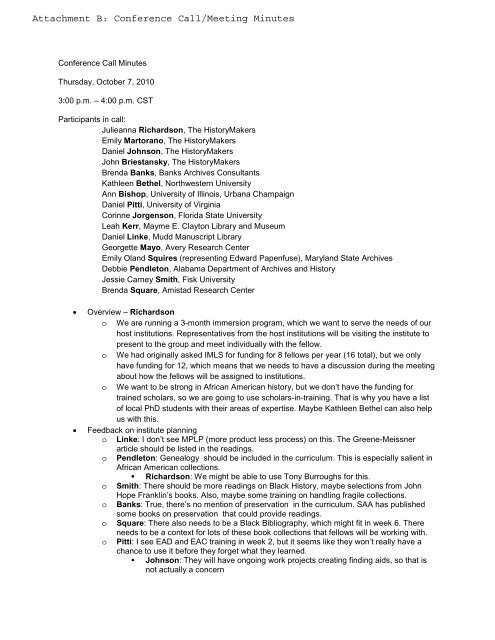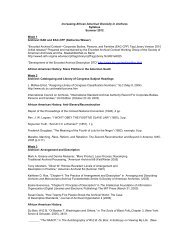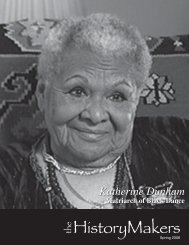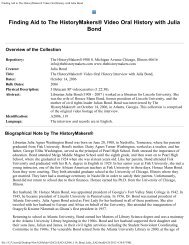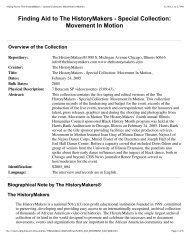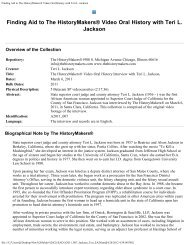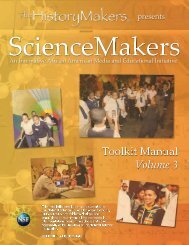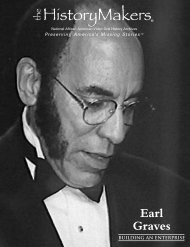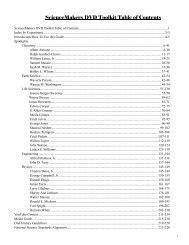Attachment B: Conference Call/Meeting Minutes - The History Makers
Attachment B: Conference Call/Meeting Minutes - The History Makers
Attachment B: Conference Call/Meeting Minutes - The History Makers
You also want an ePaper? Increase the reach of your titles
YUMPU automatically turns print PDFs into web optimized ePapers that Google loves.
<strong>Conference</strong> <strong>Call</strong> <strong>Minutes</strong>Thursday, October 7, 20103:00 p.m. – 4:00 p.m. CSTParticipants in call:Julieanna Richardson, <strong>The</strong> <strong>History</strong><strong>Makers</strong>Emily Martorano, <strong>The</strong> <strong>History</strong><strong>Makers</strong>Daniel Johnson, <strong>The</strong> <strong>History</strong><strong>Makers</strong>John Briestansky, <strong>The</strong> <strong>History</strong><strong>Makers</strong>Brenda Banks, Banks Archives ConsultantsKathleen Bethel, Northwestern UniversityAnn Bishop, University of Illinois, Urbana ChampaignDaniel Pitti, University of VirginiaCorinne Jorgenson, Florida State UniversityLeah Kerr, Mayme E. Clayton Library and MuseumDaniel Linke, Mudd Manuscript LibraryGeorgette Mayo, Avery Research CenterEmily Oland Squires (representing Edward Papenfuse), Maryland State ArchivesDebbie Pendleton, Alabama Department of Archives and <strong>History</strong>Jessie Carney Smith, Fisk UniversityBrenda Square, Amistad Research Center• Overview – Richardsono We are running a 3-month immersion program, which we want to serve the needs of ourhost institutions. Representatives from the host institutions will be visiting the institute topresent to the group and meet individually with the fellow.o We had originally asked IMLS for funding for 8 fellows per year (16 total), but we onlyhave funding for 12, which means that we needs to have a discussion during the meetingabout how the fellows will be assigned to institutions.o We want to be strong in African American history, but we don’t have the funding fortrained scholars, so we are going to use scholars-in-training. That is why you have a listof local PhD students with their areas of expertise. Maybe Kathleen Bethel can also helpus with this.• Feedback on institute planningo Linke: I don’t see MPLP (more product less process) on this. <strong>The</strong> Greene-Meissnerarticle should be listed in the readings.o Pendleton: Genealogy should be included in the curriculum. This is especially salient inAfrican American collections.• Richardson: We might be able to use Tony Burroughs for this.o Smith: <strong>The</strong>re should be more readings on Black <strong>History</strong>, maybe selections from JohnHope Franklin’s books. Also, maybe some training on handling fragile collections.o Banks: True, there’s no mention of preservation in the curriculum. SAA has publishedsome books on preservation that could provide readings.o Square: <strong>The</strong>re also needs to be a Black Bibliography, which might fit in week 6. <strong>The</strong>reneeds to be a context for lots of these book collections that fellows will be working with.o Pitti: I see EAD and EAC training in week 2, but it seems like they won’t really have achance to use it before they forget what they learned.• Johnson: <strong>The</strong>y will have ongoing work projects creating finding aids, so that isnot actually a concern
• Pitti: Good. Once you get over the initial introduction, people seem to get thehang of it.o Bishop: We should also make sure that there is some element of community outreachduring this training.o Jorgenson: What will be hardest are the specifics. <strong>The</strong> specific readings will really help.Preservation does need a place in the curriculum, as does increasing accessibilitythrough digitization.o Bishop: We should also remember that the fellows might have a wide mix ofbackgrounds. We might have to think about how their experience or lack of experiencewill need to shape our curriculum.o Pendleton: A survey of the fellows before the institute will help gauge where they are intheir training and experience.o Square: It looks like we’re progressing very quickly to EAD and EAC training – maybe weshould have an introduction to preservation and archival practices first.o Mayo: Well, what do they know about the potential fellows?• Martorano, Briestansky: We have started doing outreach to archival programsand to different communities looking for candidates. We have gotten somepositive responses already.o Linke: <strong>The</strong>re was also a question about the MLIS vs. the MA. <strong>The</strong> MA in <strong>History</strong> with anarchives component can also provide some very qualified candidates.o Banks: Has heard the same concerns. <strong>The</strong> <strong>History</strong> and Archives combination has thepotential for a very strong pool of candidates.o Bishop: We might have to check with IMLS about this.o Pitti: Archival profession is full of people without library school backgrounds but who stillhave professional training. Attracting a large pool of people in the initial stages seemsmore important than limiting the possible candidates. <strong>The</strong>n we can pick the very bestpeople.o Banks: For jobs, people are looking less for an MLS these days.o Pitti: We should also be doing some mass marketing on this. We need to be casting aswide a net as possible.• Conclusionso Richardson: Emily will be following up with you individually regarding your suggestionsabout the curriculum and to get more specific suggestions for readings. We want thecurriculum fleshed out a little more before we meet so we can have as productive ameeting as possible. We need to think critically about what we want our finished productsto look like. Any final thoughts?o Pendleton: Maybe switching the recruitment discussion to the morning so we can thinkabout who our fellows might be before we start talking about what we want to teach them.(Many people agree)o Squires: Will be sending over more ideas for readings, but Ira Berlin’s “many ThousandsGone” comes to mind.o Martorano: Please email if you want to make any corrections to either the host institutionprofiles or your name and title on the advisory board list. I will be following up soon aboutthe curriculum suggestions, and we’ll see you next weekend.
<strong>The</strong> <strong>History</strong><strong>Makers</strong> IMLS Advisory Board <strong>Meeting</strong> <strong>Minutes</strong> October 17-18, 2010Schedule OverviewSunday, October 17, 2010• Tour of <strong>The</strong> <strong>History</strong><strong>Makers</strong> office and archive led by Julieanna Richardson and Dan Johnson• Presentation on <strong>The</strong> <strong>History</strong><strong>Makers</strong> by Dan Johnson• Presentation on the specifics of the grant by Emily Martorano• Presentations from Host Institutions (Part 1)Monday, October 18, 2010• Presentations from Host Institutions (Part 2) and Recruiting Schools• Breakout Sessions:o Host Institutions: <strong>The</strong> “Perfect Fellow”o Recruiting Schools: Fellowship Listing Revisions• Group Sessiono Recruitment and Outreacho Potential Candidate Evaluationso Screening and Placemento Placement Problemso Housing• Break for Lunch• Breakout Sessionso Host Institutions: Subject Matter/<strong>History</strong> Topicso Schools: Archival Topics• Group Sessiono Summary of Breakout Groupso ConclusionsParticipant List:Debbie PendletonBrenda SquareHoward RosenbaumBrenda BanksGeorgette MayoEdward PapenfuseDan LinkeCorinne JorgensonKathleen BethelJessie Carney SmithCarmelita PickettAnn BishopLeah KerrAmy Cooper CaryPatricia Williams LessaneJulieanna RichardsonDan JohnsonEmily MartoranoJohn Briestansky• <strong>The</strong>re will be 8 fellows placed in Year 1 (one at each host institution) and 4 in Year 2.Key Decisions Made:• <strong>The</strong> SAA Fundamentals series will serve as the backbone of the archives curriculum, with someadditional supplemental articles.• <strong>The</strong> fellowship listing should be sent out again with a few revisions (most importantly, listing theMA option).Taken by John Briestansky and Emily Martorano, compiled by Emily Martorano.
<strong>The</strong> <strong>History</strong><strong>Makers</strong> IMLS Advisory Board <strong>Meeting</strong> <strong>Minutes</strong> October 17-18, 2010• Emily Martorano: background of the IMLS grant, fellowship, training program at <strong>The</strong><strong>History</strong><strong>Makers</strong>• Julieanna Richardson: goals of program – 1) hope for more public outreach from archivalprofession. With home digitization and archiving there is a real opportunity to popularizeprofession now. 2) Hope to increase diversity in the profession. Challenge facing PhD programsin many disciplines throughout the country.• Julieanna Richardson: can we identify six potential fellows per year? Need to be aggressiveabout outreach.• Brenda Banks: at SAA level, there has been a lack of a major campaign to promote archives as aprofession. "We don't recruit a diverse audience, we don't recruit anybody." Recognizes the needto broaden our audience.• Brenda Banks: specialized archival programs are necessary (electronic records, manuscripts,etc.). Nature of archives makes it necessary for more diversified programs. Problems - lack ofunderstanding from IMLS how archives operate. Most archival institutions are now looking forpeople from history program, not library program.• Edward Papenfuse: happy to have candidates from English or Political Science backgrounds.Should not limit yourself to just library candidates.• Georgette Mayo: dual degree programs provide groundwork in other disciplines and MLS which isoftentimes necessary. Working in an ethnic archive is entirely different from a Eurocentric archive;work requires a different mindset. Appraisal and acquisitions are more difficult in theserepositories.• Patricia Williams Lessane: IMLS limits on candidates is a structural barrier• Brenda Square: process will give us feedback on how to recruit. Candidate pool will show us a lotabout how we need to recruit. Many people want to do this work - historians would makeexcellent archivists but it might be difficult to reach these people.• Kathleen Bethel: oftentimes, historians do not want the MLS degree. Other organizations haverecognized the need to diversify their professions and their training.• Brenda Banks: our recruitment document will discourage M.A. in history candidates fromapplying. It is undercutting a potential group of candidates. Pool will only be library students.Qualifications limit it only to library students.• Edward Papenfuse: two excellent people from Maryland State Archives who did not have MLSdegree.• Julieanna Richardson: qualifications will be revised to include candidate pool beyond MLS degreestudents.• Edward Papenfuse: problem might be that the program manager is defining the candidate pooltoo narrowly.• [6 people present are aware of potential candidates for the fellowship; not all are MLS students.]• Leah Kerr: moving image archives students at UCLA• Georgette Mayo: her student will be ready for second round in 2012.• Corinne Jorgenson: could a history student pursuing a MLS degree be eligible. It is often hard tochange items in IMLS grants. She is part of 2 IMLS programs in increase diversity. Very hard fora potential candidate to meet all criteria (GPA, recommendations, essays, etc.)• Ann Bishop: lack of candidates won't be the problem. Many candidates might regard theopportunity as a job - promote the opportunity at ALA, ASIS, etc.• Patricia Williams Lessane: how many African American students will apply?• Julieanna Richardson: will there be more standardization in education/training in archivalprograms?Taken by John Briestansky and Emily Martorano, compiled by Emily Martorano.
<strong>The</strong> <strong>History</strong><strong>Makers</strong> IMLS Advisory Board <strong>Meeting</strong> <strong>Minutes</strong> October 17-18, 2010• Brenda Banks: most MLS archival students choose their programs based on the specialization(Michigan - electronic records). Specialization of programs is necessary to meet needs of recordsbeing created. Basics are standardized amongst programs but there will be more specialization inthe future.• Leah Kerr: UCLA's program is theory-heavy, much value in the internships.• Edward Papenfuse: librarians are moving toward cooperative ventures with archives.Collaboration with Maryland State Library and Archives.• Corinne Jorgenson: new digitization projects are blurring boundaries between libraries, archives,and museums.• Julieanna Richardson: final thoughts- 1) aggressive with outreach efforts, 2) revise application toinclude MA in <strong>History</strong> students, but strongly prefer MLS, 3) board members should identifypotential candidates and get their applications in soon• Debbie Pendleton : would love to see a mentoring program develop from this grant.• Brenda Banks: many African American archivists are on a PhD track and they are less likely toapply for this program. Problem - first application announcement specified only MLS studentsHost Institution Presentations:• Debbie Pendleton, Alabama Department of Archives & <strong>History</strong> - haven't yet chosen collections forFellows to process. Highlight: suggestions for integrated buses, 1956. Alabama state regulationsrequire only 2 archives courses for State archivists.• Brenda Square, Amistad Research Center at Tulane University - American Missionary Associationcollection and other multi-cultural holdings. Institution has embraced ARCHON -Fellow will have anopportunity to work in ARCHON. Entire staff moved away after Hurricane Katrina. Little water damageto collection, closed for 6 months. Friends Chapters in Ohio, Chicago, and New Orleans - Friendshave been collecting on behalf of ARC for years.o Kathleen Bethel: Chicago church history is in New Orleans!o Julieanna Richardson: very effective model.• Georgette Mayo, Avery Research Center at College of Charleston• Patricia Williams Lessane: hope to expand collection to entire Gullah-Geechee corridor• Jessie Carney Smith, Fisk University - would like Fellow to work on Roland Hayes papers• Julieanna Richardson: how much of your collections has been digitized?• Dan Linke: "if anyone says more than 5%, they're lying"• Brenda Square: can't digitize entire collection.Taken by John Briestansky and Emily Martorano, compiled by Emily Martorano.
<strong>The</strong> <strong>History</strong><strong>Makers</strong> IMLS Advisory Board <strong>Meeting</strong> <strong>Minutes</strong> October 17-18, 2010Monday, October 18Presentations, cont.• Edward Papenfuse, Maryland State Archives: Fellow will bring value to the collection. Fellow will writeapproximately one biography per month. Slavery project is effort to document every individualengaged in slavery prior to Civil War. Wikipedia articles must use secondary sources for research.Copyright notices on Maryland State Archives biographies nearly prevented them from being cited onWikipedia - changed to public domain. "<strong>The</strong> more proprietary we are, the less useful we are going tobe. For <strong>The</strong> <strong>History</strong><strong>Makers</strong> to be successful, it must gradually become totally and freely accessible."Maryland State Archives is 80% funded by their own income. Only state archives with a stateendowment. 7% of Maryland State Archives income is reinvested in the endowment. How to becomesustainable? Archives much become more integrated and accessible for future generations.• Linda Kerr, Mayme Clayton Library & Museum: personal collection, Mayme A. Clayton was librarianat USC and avid book collector. Interest grew into African American culture: books, manuscripts,motion pictures, photographs, newspapers, periodicals. Mayme Clayton passed away in 2006; sonAvery Clayton raised funds and moved collection to dedicated facility in Culver City. Building is ownedby the state, loaned to the county, maintained by Culver City. Dianne Watson will help negotiate along-term lease. Collection includes rare books, manuscripts, slave papers, motion pictures, movieposters, sheet music, photographs, and three copies of the first issue of Ebony. Currently not readyfor researchers. Partnerships: researchers can use collection if they help process Partnership withHuntington Library. Three part-time staff members, 25 volunteers, interns from UCLA and SJSU.Fellow would be processing Founder's papers (~20 cubic feet). Congresswoman Dianne Watson willdonate her papers and memorabilia. "To know where you're going, you have to know where you'vebeen." Executive Director Avery Clayton passed away in 2009 - lost year of progress and loss ofinstitutional memory. Received IMLS grant to search for new Executive Director.• Dan Linke, Mudd Library at Princeton University: Princeton did not admit African Americans for 200+years. "Institutions are not monolithic. Woodrow Wilson is dead." Since 2000: Summer Fellowshipprogram. Minority candidates are encouraged to apply but haven't. Library is part of the Departmentof Rare Books and Special Collections. Fellow will have discrete responsibilities but will also aid inother aspects of the department. Library has archives of Princeton University and 20th century publicpolicy papers, including Civil Rights and economists who did development work in Africa. Good trackrecord with project archivists over the years. Early adopter and leader in More Product, Less Process.Big in social media; plans for updated website. Potential fellow trips to Philadelphia and New York.Why is Schomburg Library not participating?o Julieanna Richardson: Howard is leaving, library is in transition.o Jessie Carney Smith: Why is Howard University not participating?o Julieanna Richardson: trouble making contact, was on our list. IMLS wanted a diverse groupof host institutions• Dan Linke, cont.: Fully expect to extend Fellowship for a second year. Collection major areas: publicpolicy (John Foster Dulles, et al), economists, jurisprudence (includes ACLU collection - library nowhas funding to process southern office of ACLU, will be completed when Fellow enters program).o Kathleen Bethel: loves idea of social networking. Would like to see more use of Facebook,Twitter, and blogs. Fellows should contribute to institution's libguide.o Dan Linke: fellow will also assist with liaison work with records manager in African Americanstudies.o Julieanna Richardson: how much of Princeton's collection deals with the black experience?o Dan Linke: no institutional examination of role in slave trade like at Brown University.o Kathleen Bethel: has campus experience of blacks at Princeton in the 20th century beendocumented in the archives?Taken by John Briestansky and Emily Martorano, compiled by Emily Martorano.
<strong>The</strong> <strong>History</strong><strong>Makers</strong> IMLS Advisory Board <strong>Meeting</strong> <strong>Minutes</strong> October 17-18, 2010oooDan Linke: a professor is collecting oral histories but they have not yet been accessioned.Also, slight documentation of student organizations. Fellow can help with collectiondevelopment in these areas.Brenda Square: is there a guide to African American resources in the holdings?Dan Linke: libguide can aid in this area. Manuscripts division in main library has moredocumentation.Presentations from Partner Schools:• Corinne Jorgenson: <strong>The</strong> FSU archives program. We assume that people come with a content area.<strong>The</strong>y come from all kinds of disciplines, but what we’re doing is providing a professional overlay froman organizational perspective. We have a foundations course, which deals with some of the basics ofbeing in the profession. Management of an information organization, which includes broaderprincipals which can apply to different kinds of organizations. Advanced Online Searching. <strong>The</strong>Concentration in Archives is in collaboration with other departments in the university, namely <strong>History</strong>.<strong>The</strong> degree is mostly online. We do collaboration with the other academic units. We're really lookingat the intersection between museums, libraries, and archives. We're all facing the same issues, andwe're working together on trying to prepare our students to meet the kinds of challenges of moderninstitutions. Four courses in archives, all in the history department. School just merged with theCommunications school. Training includes a number of local internship (although because we havean online program, we place people across the country).• Howard Rosenbaum: IU is completely residential, but we have started to push towards an onlineprogram. We have no undergrads, only graduate students. Bloomington is where the dual degreeprograms take place: African American and African Diaspora Studies & MLS and African Studies andMLS. Take about 60 credits - they're graduating with two masters. We have four specializations in theMLS - African Studies Librarianship, Archives and records management, digital libraries, and rarebooks and manuscripts. Archives students complete the whole MLS core, but in terms of thecertificate, they have a choice. We have a series of topics courses - they have no full time facultymember in archives, but the university archivist runs all of the classes, and he is involved in aconsortium that shares many of these courses via televised lectures at other campuses. Givesstudents a much wider range of courses to choose from. Require an internship in an archivesomewhere. Interns in the university archives are required to keep a blog as a way to publicize whatthey do. Campus resources: archives of African American music and culture (Portia Maultsby), whichhad a conference series on Detroit techno last year. Black film center and archive (Michael Martinand Mary Huelsbeck). Neal-Marshall Black Culture Center Library (DeLoice Holliday). <strong>The</strong> AfricanAmerican Arts Institute (Charles Sykes). African American and African Diaspora studies departments.• Amy Cooper Cary: UW Milwaukee SOIS. Very strong program with an undergraduate and a graduatepresence. <strong>The</strong> graduate program is bigger. <strong>The</strong> MLIS is a 36 -credit program. Has a standard corewith the same foundations as other programs. Dual degrees with many other programs on campus(English, history, anthropology). <strong>The</strong> MLIS can be done completely on-site or online, but the otherprograms don't have that online presence. <strong>The</strong> archives concentration is 15 credits, and it includes apracticum. We have students doing fieldwork everywhere, because of this online presence. Tworequired courses and three electives for the archives concentration. Amy Cooper Cary teachesarrangement and description online and in person. All archives are in the MLS, and come out with atranscript in that says archives. Work collaboratively within the SOIS, and we have strengths ininformation organization, in digital libraries, information ethics. <strong>The</strong>re are area research centers allover the state of Wisconsin, which are very good resources for students. Recently launched anexhibit on the civil rights movement in Milwaukee. Large news film collection, which is an interestingcollection that students benefit from.Taken by John Briestansky and Emily Martorano, compiled by Emily Martorano.
<strong>The</strong> <strong>History</strong><strong>Makers</strong> IMLS Advisory Board <strong>Meeting</strong> <strong>Minutes</strong> October 17-18, 2010• Ann Bishop: John Unsworth couldn't be here, so I won't try to cover his realm of the curriculum. I'mprobably here because of my work in community informatics and community engagement. If you lookat our numbers, we have a long way to go in terms of diversity. We don't try to increase diversity outof the goodness of our hearts, but because it's absolutely essential to reaching the communities wehope to serve. We have an IMLS grant in community informatics, trying to take the archive out intothe community at a grassroots level, and maybe through this more young people will see the field asrelevant to them. Leon Dash has worked with children as young as 10 or 11 on oral history andinvestigative journalism. We have a relationship with the Puerto Rican cultural center, where studentsin a high school curated an exhibit in the Newberry library. What are our communities engaged in,and how can we bring our resources and skills into those projects.Breakout Sessions: Host Institutions to discuss the “Perfect Fellow” while schools revise the fellowshiplisting.Host Institutions: <strong>The</strong> “Perfect Fellow”Host Institutions are requested to list the following: skill sets, demeanor and academic training of the idealfellow. Entry-level salary and workplace specifics of the institution.• Alabama:o self-startero curiouso interested in African American historyo ok with life in small southern cityo like peopleo ability to work aloe and with peopleo organization skillso research skillso writing skillso multi-taskero ability to work with a wide variety of peopleo basic understanding of archival principleso some arrangement and description experienceo good grounding in US and African American historyo writing skillso $30,000 with an excellent benefits packageo some Saturday work; you can really live on $37,000 in Montgomeryo open to public 8:30-4:30, flex hours available (7:30-5:00)• Amistado papers of visual artists, museums, historians,o social media and websiteso multimedia formatso oral history and filmo arranging and describing manuscriptso organizational recordso photographso flexibilityo ability to work with diverse research communityTaken by John Briestansky and Emily Martorano, compiled by Emily Martorano.
<strong>The</strong> <strong>History</strong><strong>Makers</strong> IMLS Advisory Board <strong>Meeting</strong> <strong>Minutes</strong> October 17-18, 2010o African American history and culture (esp. music and art)o writingo creativeo ability to work independently and cooperatively in groups, team playero 8-5, M-Fo $35-40,000• Averyo must be willing to learn about South Carolina Lowcountry historyo assertive in creating new ideas and opportunitieso advocate for the institution and professiono following directionso team play (ego in check)o appreciating the mission of our institutiono not afraid to contribute to the collectiono analytical/big picture thinkero strong writing skillso flexible with assigned dutieso MLIS or public historyo social media skillso background in African American history and cultureo have an internship or other experienceo m-f 8:30-5 s 12-5 (on Saturday a month, and one evening cultural event)o $37-40 K• Maryland:o strong interest and background in historyo sense of time and placeo good writing and language skillso basic keyboarding, database, and spreadsheet skillso organizational skillso self-motivatingo "other directed" (they are not the most important person)o entry-level: $31,000 with full benefitso t-s public reference, m-f other staff 8:30-4:30o Maryland state archives are in Annapolis and Baltimore city archives• Fisko some work experience in archival processingo masters in lib or info studieso academic training - African American studies or African American history at theundergraduate levelo independent workero professional behavioro approachableo bring new ideas into our programo good writero workplace - pleasant workplace, but IT staff leaves much to be desiredo Hours - 8-12 and 1-5. some flexibilityo salary is ok, but they would like to offer more (need to be pushing the archival salariesup)Taken by John Briestansky and Emily Martorano, compiled by Emily Martorano.
<strong>The</strong> <strong>History</strong><strong>Makers</strong> IMLS Advisory Board <strong>Meeting</strong> <strong>Minutes</strong> October 17-18, 2010• Mayme Claytono oral historieso grant writingo digitization knowledge (meta data)o arrangement and descriptiono ability to train otherso flexible and willing to multi-tasko inquisitiveo $45,000 (the cost of living is very high is LA)o hours are Tuesday, Thursday, & Saturday now, but by the time a fellow arrives it wouldbe a 9-5 situation• Princeton:o Understands research (doing it, and helping people do it)o Good writing skills (very important)o Ok with suburban livingo outgoing and confidento $42,000 for an entry-level archivist with benefitso 20th Century American history (civil right and legal history) - lowest priorityo 8:30-5:00o Understands arrangement and description• <strong>The</strong> <strong>History</strong><strong>Makers</strong>o flexibilityo video/Photoshopo attention to detailo hard workingo database experienceo EAD finding aidso eventso MA/MLISo archival experienceo $33,000Recruiting Schools: Revisions of Fellowship ListingBreakout group: Amy Cooper-Cary, Ann Bishop, Howard Rosenbaum, Corrine Jorgenson, KathleenBethel, Carmelita Pickett, Brenda Banks.Instructions: Review job description and rewrite based on new criteria.• Kathleen Bethel: what does "recent graduate" mean?o Julieanna Richardson: graduate 3 or 4 years ago?o Amy Cooper Cary: too long.o Corinne Jorgenson: 2 - 3 years.• Kathleen Bethel: can we leave GPA off? Remove Brown's Subject Headings and LCSHsentence. Insert space for community outreach event. In light of discussion today, make logonline.o Howard Rosenbaum: change name to "journal."• Carmelita Pickett: how will institutions be accountable?Taken by John Briestansky and Emily Martorano, compiled by Emily Martorano.
<strong>The</strong> <strong>History</strong><strong>Makers</strong> IMLS Advisory Board <strong>Meeting</strong> <strong>Minutes</strong> October 17-18, 2010• Ann Bishop: No whiners.• Jessie Carney Smith: Fellow can bring something to the institution itself, which could be different foreach institution.(see previous discussion for more discussion on each individual institution)• Debbie Pendleton : We would like an African American fellow. That’s very important to us. Don't carewhat kind of degree, but they have to have some coursework in archives.• Brenda Square: New Orleans is a new frontier for young people, with an interest in contributing to ourrecovery. (Need to come excited, but serious. Not distracted by the partying). Someone who wants tomake a difference and do something very important. We need someone who is fast, in terms ofresearch. Backlog of acquisitions - need an understanding of the gaps in the historical record.Someone who is fascinated and engaged in history. "Content awareness." Creative, find ways tomarket and be better advocates for the profession. Have not been able to hire people (aside fromgrant funding) post-Katrina. ARCHON.• Georgette Mayo: <strong>The</strong> weather is great (except for the hurricanes). Integration of technology skills andthe African American collection. <strong>The</strong>re is a cultural disconnect between the theoretical training andworking in an ethnic archive• Patricia Williams Lessane: <strong>The</strong>re have been issues in assessing the research value of items. <strong>The</strong>archivists are white, and don't necessarily see the value of certain items to the black community.(Georgette Mayo: That's why we need a black fellow)• Georgette Mayo: Also ties into the ethics issues. It's when you knowingly accept a collection on facevalue and then on further examination you can't deal with it, that conversation needs to happenimmediately. Donor relations in relation to acquisitions is important. <strong>The</strong>re is politics involved in takingcollections.• Brenda Square: You're talking about two different issues: the acquisitions and the processing, whichoften comes years later. You need people with an understanding of the needs of the historical record.We've had the same problem with some staff members who don't understand why we're takingcertain things. For example, taking a family history might not be taught in library school. It takes timeto do the discussion about appraisal.• Dan Linke: Maybe for the training aspect, maybe appraisal needs to be a part of it. What makes acollection worth keeping?• Edward Papenfuse: <strong>The</strong> appraisal is very important.• Corinne Jorgenson: It depends on your mission of your collection. It's a matter of different opinions onwhat a collection can contribute.• Edward Papenfuse: You're looking for someone who can. We have a large collection of whiskeybottles. This was a huge documentation of an industry that had disappeared. You bring people in thatknow how to look for value. Everything has value. (Example about the I Have a Dream speech givenat a Morgan commencement before the well-known one.)• Jessie Carney Smith: We have been put in a bind by our president who just goes out and acceptsstuff. We just wait until he leaves, and then we forget about it.• Edward Papenfuse: We had a governor who filled up three townhouses with his memorabilia, which isnow at the state archives. What is the most appropriate place, and how do we assign value.• Leah Kerr: We have a responsibility to find the right place for it if we have the wrong place.• Dan Linke: We have the same problem, where people who went to Princeton want to bring theirpapers there.• Georgette Mayo: (Back to the original discussion)• Edward Papenfuse: <strong>The</strong>re are two important things: Need to explore whether the individual has atalent for research. Learn how to assess value and do effective research. Needs to have a talent forpersuasion. <strong>The</strong>re will be situations in which this is necessary. One for the fellows will beTaken by John Briestansky and Emily Martorano, compiled by Emily Martorano.
<strong>The</strong> <strong>History</strong><strong>Makers</strong> IMLS Advisory Board <strong>Meeting</strong> <strong>Minutes</strong> October 17-18, 2010• LSU - SLIS Listserv (Dr. Alma Dawson,Elizabeth Dow)• University of Pittsburgh-<strong>History</strong>/ArchivesPrograms• Michigan State University (Archives andTechnology)• Honor Society Lists (Beta Phi Mu)• USC-Columbia (Dr. Valinda Littlefield,Director of African American Studies)• Organization of Public <strong>History</strong> (Bob Weyenth- Program Director)• Julieanna Richardson: should a cover letter accompany the listing? Would background information onplacements be helpful?o Amy Cooper Cary: would benefit recent graduates.o Debbie Pendleton : students should research themselves. Include hyperlinks in notice.• Jessie Carney Smith: Page 2: add ASALH to professional conferences.o Julieanna Richardson: IMLS want Fellows at library & archives conference.• Dan Linke: add presentation board - poster presentation• Leah Kerr: add caps: MLS degree preferred OR graduate degree in other relevant field.• Debbie Pendleton : or work experience is problem for her institution - state guidelines requirecoursework or two years' relevant experience.• Corinne Jorgenson: *note: different programs have additional requirements.o Emily Martorano: keep it broad now and fit candidates for institutions during selectionprocess.• New corrections:o Page 1: Add hyperlinks to host institutionso Page 2: remove "they should also" from "include a printout of classes..."Review of CandidatesHost institutions discussed candidates who had submitted a resume upon request. <strong>The</strong>y indicatedwhether they would consider them for their institution and why.• Jennifer Daugherty: processing and reference experience, interest and experience, relevantexperience, (Mudd, Alabama, Avery)• Tamyka Miles: judicial experience, coordinating volunteer programs, strong personal experience -could benefit reference work (Maryland)• Levon Williams: strongest candidate, digitization skills, strong interest in music collections, veryambitious (Mudd, Mayme Clayton, Alabama, Amistad, Avery)• Alyss Hardin: digitization experience, technological skills, strong advocacy experience (MaymeClayton, Alabama, Avery)• Stephanie Maxwell: good background in African studies, processing and reference experience,student at good program (Catholic U.), local for Maryland State Archives, inventory experience withserials and rare books, (Mudd, Maryland, Mayme Clayton)• Jacquelyn White: potentially a strong independent worker (Mudd)• Da’vian Smith: speaks fluent Spanish (little has been done for Spanish speaking community atMaryland State Archives), (Maryland)• Ketti Tonnemacher: interest in archives, volunteer work, good summary of qualifications. (Alabama)Screening/Placement:Taken by John Briestansky and Emily Martorano, compiled by Emily Martorano.
<strong>The</strong> <strong>History</strong><strong>Makers</strong> IMLS Advisory Board <strong>Meeting</strong> <strong>Minutes</strong> October 17-18, 2010• Emily Martorano: we will have spreadsheet of candidates. Host institutions can request moreinformation from <strong>The</strong> <strong>History</strong><strong>Makers</strong> for their preferred candidates.• Julieanna Richardson: Interview process: group interviews (candidate, host, <strong>The</strong> <strong>History</strong><strong>Makers</strong>) atbeginning?o Dan Linke can volunteer Princeton's conference call line.• Emily Martorano: Kevin Cherry - fellows should definitely present at SAA and other conferences ifthere is room in the budget. No benefit package included in grant.• Julieanna Richardson: fellows will know their host institution when they arrive in summer. 3-4substitutes will be designated and notified• Julieanna Richardson: fellows who drop out will be replaced by an additional candidate the followingyear• Debbie Pendleton : thought each institution would have a fellow in summer '011, then the remainingwould be divided the following year.• RESOLVED: 8 Fellows in Summer '011.o Emily Martorano: budget would have to edited, IMLS has to be notified• Emily Martorano: An option for year 2 is that some institutions (more than the 8 we have) could payfor a fellow to attend institute during second year.Housing• Julieanna Richardson: what are good possible housing options in your area?• Leah Kerr: 1 bedroom in LA is $1200-$1400 (unfurnished)• Edward Papenfuse: best bet would be renting rooms from someone's home. some applicants may bemarried couples, with families.• Brenda Square: rising rents in New Orleans now. Would suggest graduate housing at Tulane andLoyola. Friends Chapters should be approached for suggestions.• Julieanna Richardson: house-sitting?• Kathleen Bethel: universities have off-campus housing offices.• Debbie Pendleton : process should begin right after the placement is made. Hosts can help aid in theprocess.[lunch]Breakout Sessions• Julieanna Richardson: who is presenting subject matter? Focus should be more on bibliographies.• Howard Rosenbaum: fellows should prepare a research paper by putting host collection in context• Julieanna Richardson: how to best address issues of race - NEH fellows needed icebreakers torelieve tensions.• Kathleen Bethel: race in context of archives, libraries?• Leah Kerr: race in American history?• Georgette Mayo: good facilitators can focus solely on race and icebreakers and help group bond.• Leah Kerr: first day would be best for this session.• Dan Linke: can money be made available to bring in facilitators?• Kathleen Bethel: Black Intelligence Test of Cultural Homogeneity (70s)Recruiting Schools: Archival Training in CurriculumTaken by John Briestansky and Emily Martorano, compiled by Emily Martorano.
<strong>The</strong> <strong>History</strong><strong>Makers</strong> IMLS Advisory Board <strong>Meeting</strong> <strong>Minutes</strong> October 17-18, 2010• Ann Bishop: community of learning, group activity, what do we do for ideal learning? How will welearn from each other? What are expectations for learning community?• Corinne Jorgenson: staff retreat - teambuilding exercises (she did not attend but can let us know).[Review curriculum day by day, with topics, field trips, presentations]• Kathleen Bethel: would like biographies of African American bibliophiles and archivists. (DorothyPorter, Sean Burke, Ernest Kaiser) Can watch <strong>The</strong> <strong>History</strong><strong>Makers</strong> interviews of Walter Hill, HowardDodson.• Dan Johnson: emphasis for them to go to their host institution with archival knowledge• Kathleen Bethel: scholarly communication and advocacy?• Dan Johnson: host institutions added aspects of curriculum.• Ann Bishop: can we include career and other future trends - community archiving or other new jobswhich develop in the profession. Cohort development is especially important with minority studentsand first generation college graduates - very powerful, an extra layer of impact beyond which fellowswill accomplish at their host institutions - they are in charge of shaping future of field.• Dan Johnson: fellows will be interviewed at the end of the training institute but maybe they should beinterviewed more often (i.e., as they are participating in workshops, video journals).• Howard Rosenbaum: make sure fellows do plenty of writing• Brenda Banks: sent her comments to Emily last week, regarding resources. Bring more currentsources in to curriculum. Hunter's book was good when it was current. Second edition is no longercurrent. Ritzenthaler - preservation. Kathleen Roe. New book on reference. Go to SAA website:Archives Fundamentals 2 series. Amy Cooper Cary: online glossary is very useful(http://www2.archivists.org/glossary/preface)Field trips: will help supplement the topics.• Kathleen Bethel: how will students receive historical readings?o Julieanna Richardson: chapters will be scanned.• Kathleen Bethel: "Jesus, Jobs, and Justice" by Bettye Collier-Thomas - very valuable for researchmethods and research in black church history corrections.• Brenda Banks: her first book on black migration is still relevant.• Kathleen Bethel: Tony Burroughs for genealogical research. 1970 - Directory of Afro-AmericanResources, edited by Walter Schatz• Amy Cooper Cary: most recent articles on curriculum are from 2008. If articles are not from threemost recent issues, there will be a problem distributing links.• Brenda Banks: potential for collaborative cooperation with SAA. Amy Cooper Cary: talk to TeresaBrinati (SAA Director of Publishing) Nancy Perkins-Beaumont is Executive Director.o Julieanna Richardson: we should invite them over.• Julieanna Richardson: we have contacted BMRC for a joint session/meet and greet• Kathleen Bethel: "Mapping the Stacks" at University of Chicago - what was in their curriculum?http://mts.lib.uchicago.edu/ Director - Jacqueline Goldsby• Julieanna Richardson: too many readings during NEH institute, readings were not always discussedduring the class sessions.o Dan Johnson: readings will relate to sessions. We will try to bring in guest lecturers forhistorical topics.o Howard Rosenbaum: have guest lecturers suggest 3 readings as soon as possible. Asklecturers to think of two questions for each reading to stimulate the discussion.o Ann Bishop: clarify if the lecturers would like to have readings distributed beforehand.o Kathleen Bethel: speakers rarely speak to the readings.Archival curriculum:Taken by John Briestansky and Emily Martorano, compiled by Emily Martorano.
<strong>The</strong> <strong>History</strong><strong>Makers</strong> IMLS Advisory Board <strong>Meeting</strong> <strong>Minutes</strong> October 17-18, 2010Include: scholarly communication, advocacy, community archives (include in outreach and publicprogramming), and looking towards the future of the archival profession• Ann Bishop: community and civic engagement is different from community outreach. Try to get fullfledged scholars, not just PhD students, for guest lectures• Howard Rosenbaum: why is there training in audiovisual materials in week 1 and week 10?o Dan Johnson: training is necessary to understand <strong>The</strong> <strong>History</strong><strong>Makers</strong>' collections. Additionaltraining in week 10 is for sheet music, film, and other materials not included in <strong>The</strong><strong>History</strong><strong>Makers</strong> collections.• Kathleen Bethel: early site visits are more helpful.• Dan Johnson: appraisal has been moved to week 2. Preservation can be moved forward.Preservation issues can be interjected into each archival topic from the beginning of the institute.• Howard Rosenbaum: to accommodate technical sessions early, reference, copyright, or outreachshould be moved to the end.o Kathleen Bethel: reference is more relevant at their host institutions, keep training at the endof the institute.• Howard Rosenbaum: have a list of citations for all readings.• Amy Cooper Cary: in addition to the assigned readings, a list of other readings and resources wouldbe helpful• Howard Rosenbaum: can we work out an arrangement with a local university to gain access to thedatabases? (8 people for 3 months).o Julieanna Richardson: we could not set it up with U of I.o Corinne Jorgenson: each person needs university student ID.o Carmelita Pickett: there is enough time for students to use the library in person as walk-ins.o Ann Bishop: will inquire at GSLIS to see if fellows can use their databases. Whichdatabases?• Howard Rosenbaum: is there a separate list of assignments for fellows?Finding aids:• Corinne Jorgenson: students should be aware of workflow and expectations. How many finding aidsto produce each day/week?o Dan Johnson/Julieanna Richardson: initial finding aids will be watched closely to judgeprogress. What will be the process for fixing mistakes?• Howard Rosenbaum: syllabus is like a legal contract. Do not change a syllabus unless it is madeeasier for the students.• Ann Bishop: Example or resource sites should be included. Example: Shoah Foundation website,websites of organizations (SAA, etc.), review websites in place of reading chapters.o Kathleen Bethel: online exhibit of slavery documents from New York Historical Society. AnnBishop: good idea if goal of program is to have students be up on new technologies.• Social media: currently is not in curriculum.o Julieanna Richardson: have fellows create a Facebook page for their institution?o Kathleen Bethel: it is an institutional decision.o Howard Rosenbaum: ask fellows how much they know about social media. Have the fellowswho know about it the most teach the rest of the group. Activities like this are a good idea forbonding and forming a cohort. Also, have a private space for the fellows to talk outside of <strong>The</strong><strong>History</strong><strong>Makers</strong> and encourage them to use it.Host Institutions: Curriculum[Group brainstorming results. No note-taker present.]Taken by John Briestansky and Emily Martorano, compiled by Emily Martorano.
<strong>The</strong> <strong>History</strong><strong>Makers</strong> IMLS Advisory Board <strong>Meeting</strong> <strong>Minutes</strong> October 17-18, 2010• Move history topics to Monday• <strong>The</strong> topics are huge; we need smaller focuses for our fellows to learn about.• We need to clarify the expectations of the workday.• We cannot legally be copying the readings into a toolkit to be widely distributed.o Edward Papenfuse: I pass out a CD at the beginning of the semester with all the readings onit, and when they return it at the end of the semester it's been loaned out from my personallibrary for legitimate educational use.• This project is an opportunity to do a survey on the state of the black historical record• Add NET productions in the journalism curriculum• Scholars can be advocates for archives• Incorporate <strong>History</strong><strong>Makers</strong>' collections in the curriculum (ex., when you're reading John HopeFranklin, watch some of his interview)• AASLH pamphlet series is a very good resource• Ted Cook at U of C is great with local history• Michael Flug, who just retired from Woodson, might be able to come speak• We should look into the resources at the Chicago Historical Society and the Chicago Public Library• Black Bibliographies: Mayme Clayton, Dorothy Porter, Elinor Sinnette• Fisk has a tape of John Hope Franklin.• Appraisalo Timed release of historic personal material (i.e. medical records, etc)o Priorities in appraisal need to be clear for each institution (ex. Joe Madison's Sudan papersneeded to be made public sooner rather than later because of the relevance of the situation.)o We could really use some example cases in teaching these topics. (Thurgood Marshall'spapers were to be opened after a certain date, but they contained things they shouldn't have)• Our history discussions should be a mix of the historical topics and the resources out there for doingresearch on that topic.o <strong>The</strong> PhD students can be very helpful in this regard. Talking about their research but moreabout their research process and how they used archives.o We need people who can discuss the levels of documentation.o Having big names engaged with the fellows would be an invaluable experience.• We should think about having the fellows do some reading before they arrive at the institute.o One should be one of those big survey books, like John Hope Franklin, Benjamin Corals, orPeter Kolchino Another good thing to read would be Roots, which really shook up the historical community inhow research is done, and his research would be a great example for the fellows.o We could also look at some of the American Experience programs as a resource.• On the first week's discussion on the African American collectiono We need to broaden our understanding of where material is found in the African Americanhistorical record.o Are all materials dealing with African Americans "African American Collections"? (Ex. <strong>The</strong>AMA collection is about African Americans, but was created from a white point of view.)o We need to make sure that Public Collections are approached from an African Americanperspective.• Genealogyo <strong>The</strong>re was a national geographic program on DNA and race that could be helpful to fosterdiscussion at the beginning of the program and again at the endo <strong>The</strong>re was an article about Ancestry.com's use of DNATaken by John Briestansky and Emily Martorano, compiled by Emily Martorano.
<strong>The</strong> <strong>History</strong><strong>Makers</strong> IMLS Advisory Board <strong>Meeting</strong> <strong>Minutes</strong> October 17-18, 2010o People are mixing family history and scienceo and court records are also really important for this (and for civil rights)• <strong>The</strong> SAA Fundamentals series should be the basis of our curriculum• Only a few other supplementary articles (otherwise too much)• We should talk to the SAA about donating these to us• <strong>The</strong> Diversity Roundtable should be able to help us with thatGroup Session:Concluding statements.Taken by John Briestansky and Emily Martorano, compiled by Emily Martorano.
Feedback on Daily Schedule (Sent 10/13/10)Carmelita Pickett:• What about law? Copyright and gift agreements [will send over readings today]• Also, the SAA’s Archival Fundamentals Series.Jessie Carney Smith:• <strong>The</strong> Conservation Center for Art and Historic Artifacts in Philadelphia has some good sourcesthat will help with conservation. www.ccaha.org• Consult their website to see what they have done for Historically Black Colleges and Universities(HBCUs).• Fisk is working with CCAHA as well as the North East Document Conservation Center.Daniel Linke• Covered his MPLP and appraisal articles and suggestions.Debbie Pendleton• Has been very busy, but saw that we added genealogy and was glad. Will try to send over morereading suggestions when she has a chance.Brenda Square• ARCHON should be included – eliminates usage of EAD; in use at Amistad.• Will bring brochure for presentationBrenda Banks:• “This looks pretty good...except for the absence of readings from the recent SAA fundamentalseries. which presents the most up to day standards for the archival profession. I used Hunter'sbook when I taught for several years because it was current and fairly simple but even the it wasnot my first choice for preservation. Mary Lynn Ritzenthaler's Preserving Archives andManuscripts, a 2010 publication, is the current standard. Kathleen Roe's Arranging andDescribing Archives and Manuscripts is the most recent publication for A&D. I feel that itwould be a gross error omit readings from these two books.”Georgette Mayo:• Emailed names of readings on:o Community Outreach, Advocacy, and Promotiono Professional, Ethical, and Legal Responsibilitieso Archiving Film, Music, Video, and Arto Disaster PreparednessSquires – voicemail, responded “no comments” via email.Bethel – hasn’t looked yet, will call if she gets a chanceJorgenson – hasn’t looked yet, will send over notes if she gets a chanceKerr- messageBishop – voicemailPitti - voicemailAmy Cooper Cary - voicemailHoward Rosenbaum - voicemail
Further Feedback on Curriculum:Rosenbaum:Not sure what you want from IU. [response] All of IU’s syllabi are online for review. For my presentation,I can talk about our course offerings and see what could be helpful to draw from. [response: specificallywanted more preservation and introduction to archival practices] I can look at our courses right now andsee what would be helpful on that front and send you that information. [response: yes, please]Pendleton:Family histories are becoming more and more important in black archives; the ordering of the EAD/EAC-CPF did seem backwards – this might only be relevant if we have people with less archival background.<strong>The</strong> whole African American history readings did need to be stepped up a bit.Smith:<strong>Call</strong> was cut off around 10 to 4. She got a busy signal all of a sudden. But she got minutes and is allcaught up now.What is someone was interested in medical archives?Nothing else to add.Maryland (Oland Squires):Feedback via email:For week 3: Many Thousands Gone: <strong>The</strong> First Two Centuries of Slavery in North America by Ira Berlin(Harvard U Press, 2000)For week 5: <strong>The</strong> Making of African America: <strong>The</strong> Four Great Migrations by Ira Berlin (Viking Press, 2010)John Hope Franklin’s From Slavery to Freedom would be a good overarching text. We also use RunawaySlaves: Rebels on the Plantation as a reference in our own Underground Railroad project.Linke:Mentioned MPLP.An article in American Archivist in the mid 1980s on appraisal. Frank Boles & Julia Marks Young. “<strong>The</strong>black box of appraisal”<strong>History</strong>: one book from archives perspective is Ar'n't I a Woman?: Female Slaves in the Plantation Southby Deborah G. White, which uses oral history.
Whole host of archives blogs that might be interesting. Archives next. Blogger: Chris Pron. Lots of info onelectronic records. <strong>The</strong>se are often where people are trying out and talking about new stuff.EAD should indeed be later. Week 2 should be more arrangement, description. Unless they went toschool at a very special place, they’re not going to have EAC yet.Banks:Doesn’t seem to do any kind of refresher. Library students will not have any basics of archives. Have tounderstand the material before you can get to EAD. Even knowing how the materials are used byresearchers helps in arrangement and description. As it stands, the curriculum doesn’t help anyone whodidn’t study archives.Bishop:<strong>The</strong> more we talked, the more I started to imagine something kind of modular program – probably getcandidates who have been through an archives already but we won’t know the fellows’ experiencelevels before they get here.Also might want to put a little bit more attention on “what we can learn from the fellows” – how we canincrease diversity, attract more minority students. We need to learn from them about these things.Might be possible to find more host sites that would themselves pay for the interns. Often more peoplewant to get involved.Square:Depending on the experience of the fellows, they may need a good introduction to preservation,including arranging and describing collections. Also a good overview to reference services (providingaccess to collections) and to acquisitions. A good introduction could be good for everybody, becausethere are different kinds of programs. Basic Fundamentals series by SAA. Most archivists will have readthem. Will help people with the essentials who haven’t been trained in archives.Bethel: MessageMayo: Office closedPitti: MessagePickett: Hasn’t had time to look at anything.Cooper Cary: Out of office until 10-13.Jorgenson: Nothing to add.Kerr: Out of office.


